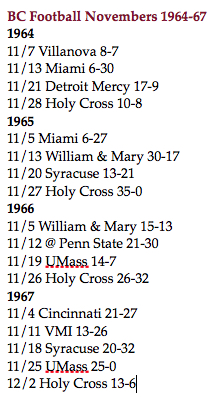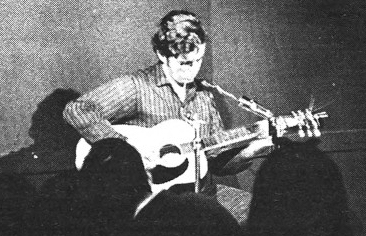Football games, except for Holy Cross in 1967, ended in November, and for the most part basketball and hockey didn’t start until December. School was in forward gear, but thoughts of the Thanksgiving break . . . and the climactic Holy Cross football game . . . loomed large. Here’s some of what happened in Chestnut Hill and in the world in Novembers, 1964-67.
On campus
1964
 The School of Education advised that, while there might be an exception or two, women students would not be permitted to marry as undergraduates. In the November 13 article, Mary Kinnane, dean of women at Education, said, “We adhere to the position that a woman cannot be a full time undergraduate student, a full time wife, and a full time homemaker.”
The School of Education advised that, while there might be an exception or two, women students would not be permitted to marry as undergraduates. In the November 13 article, Mary Kinnane, dean of women at Education, said, “We adhere to the position that a woman cannot be a full time undergraduate student, a full time wife, and a full time homemaker.”
We elected class officers in each school, as reported in the November 20 Heights. Elected president were Peter Driscoll (A&S), Felix Albano (CBA), Peggy Grace (Nursing), and Kathy Cooney (Education).
1965
The requirement that Catholic students attend a religious retreat each year was cancelled. A Heights editorial in the November 5 issue entitled “Amen” praised the decision. It reported that an annual retreat was compulsory for all Catholic students a year before and argued that a “compromise” six months previous that had reduced the requirement to two retreats in four years was insufficient.
The November 19 edition contained an interview of Robert Drinan, SJ, dean of the law school, conducted by four Heights editors. Fr. Drinan was outspoken on many matters during the mid- and late-sixties and was elected in 1970 to Congress. He was re-elected four times and left Congress in 1981 after Pope John Paul II ordered all priests to withdraw from electoral politics. Fr. Drinan died in 2007.
1966
A two-day convocation November 11-12 marked the dedication of Higgins Hall, the new science center. The November 18 Heights article about the dedication reported that the building was named for John Higgins, a close friend of Boston businessman and philanthropist Stephen Mugar. Among the four scientists presented honorary degrees during the dedication ceremonies was James Van Allen of the University of Iowa, after whom the Van Allen radiation belts are named and Time Magazine’s Man of the Year in 1960. An article in the November 4 Heights previewing the dedication provided additional information.
We’ll talk much more about the “coffee house” in O’Connell. Here we simply note that Middle Earth opened on November 11, as reported in the November 18 Heights. Among those appearing in the first talent lineup was classmate Bill Dalton.
1967
The November 3 Heights had several articles related to controversy generated by an incident at the BC Law School several days earlier when three members of the Law faculty confronted a representative of the Dow Chemical Co. on campus and asked that he leave. The Dow representative was there (BC Law was then in More Hall) to see three students who had signed up for interviews. Dow was the principal manufacturer of napalm, an incendiary chemical used by the US military in Vietnam and the focus of criticism. An estimated 200 Law students and faculty gathered to observe or participate in a debate over the actions of the faculty members. A Heights editorial on the subject criticized the faculty members’s attempt to bar the recruiter, saying, “No one has the right to judge another person’s worthiness in regard to his possible appearance on campus.” A followup article in the November 13 Heights reported on BC policy regarding on-campus recruiting and mentioned that Law students had voted 319 to 63 in support of a completely open recruiting policy.
About 400 students, faculty members, and staff attended a “Rally in Support of Troops in Vietnam” November 6 on the Bapst Library lawn. The rally was sponsored by the BC chapter of Young Americans for Freedom.
Classmate Richard Sawaya resigned as editor of The Stylus, the campus literary magazine, because of a censorship dispute, according to the top story in the November 17 Heights. Francis Sweeney, SJ, “advisor” to the magazine, had objected to a Sawaya story in which he described “an act of love between a man and his wife and the use of religious imagery in a sexual connotation in a second story, which Sweeney considered blasphemous,” the Heights reported. Sawaya and Fr. Sweeney had brought the issue to Carl Kowalski, director of student activities, who determined that faculty advisors did not have veto power over student decisions. Fr. Sweeney, appointed by the BC president, brought the issue to President Michael Walsh, SJ, who decided that Fr. Sweeney, in this case, did have veto power. The same issue carried a Heights editorial that criticized both the decision and the process that brought it about.
The outside world
1964
LBJ won big, easily defeating challenger Barry Goldwater on November 3, winning in 44 states and the District of Columbia. The Verrazano-Narrows Bridge connecting Staten Island and Brooklyn opened. English replaced Latin in Masses in the US.
1965
Days of Our Lives premiered on NBC. A crowd estimated at 15,000+ protested the Vietnam War in Washington, DC. US and North Vietnamese regular forces met for the first time in the Battle of Ia Drang.
1966
For the first time, the entire program lineup on NBC was broadcast in color. Ronald Reagan was elected governor of California. US bishops ended the rule that Roman Catholics could not eat meat on Fridays. Massachusetts voters elected Republican Edward Brooke to the US Senate, making him the first African-American senator since Reconstruction. The Washington Redskins defeated the New York Giants, 72-41, the highest scoring game in NFL history.
1967
Sen. Eugene McCarthy (D-Minn.) announced his candidacy for US President. US Secretary of Defense Robert McNamara resigned.


Didn’t Simon & Garfunkel play at Roberts Center in the fall of 1967?
They appeared in Roberts Center, May 4, 1968.